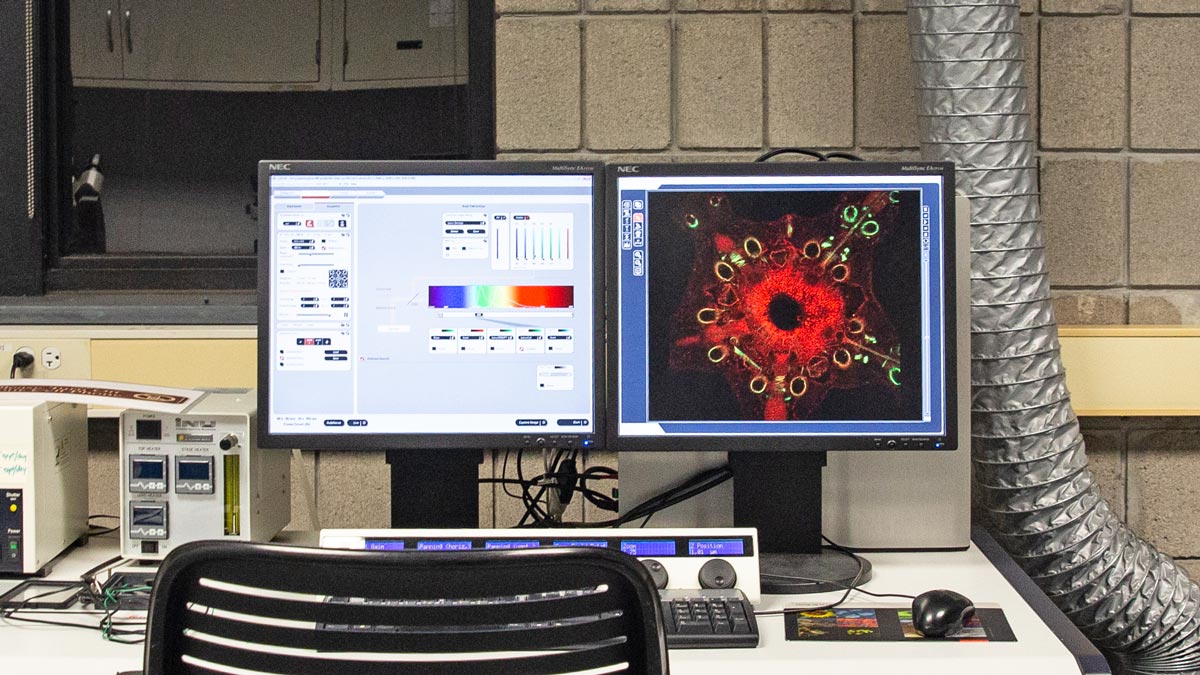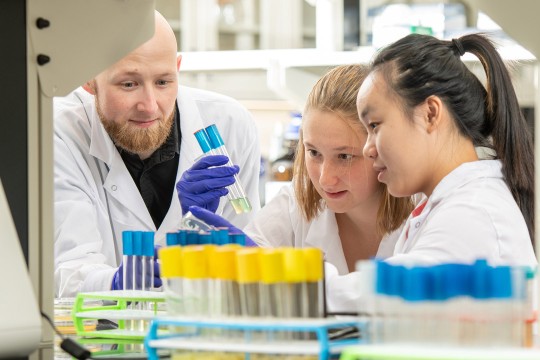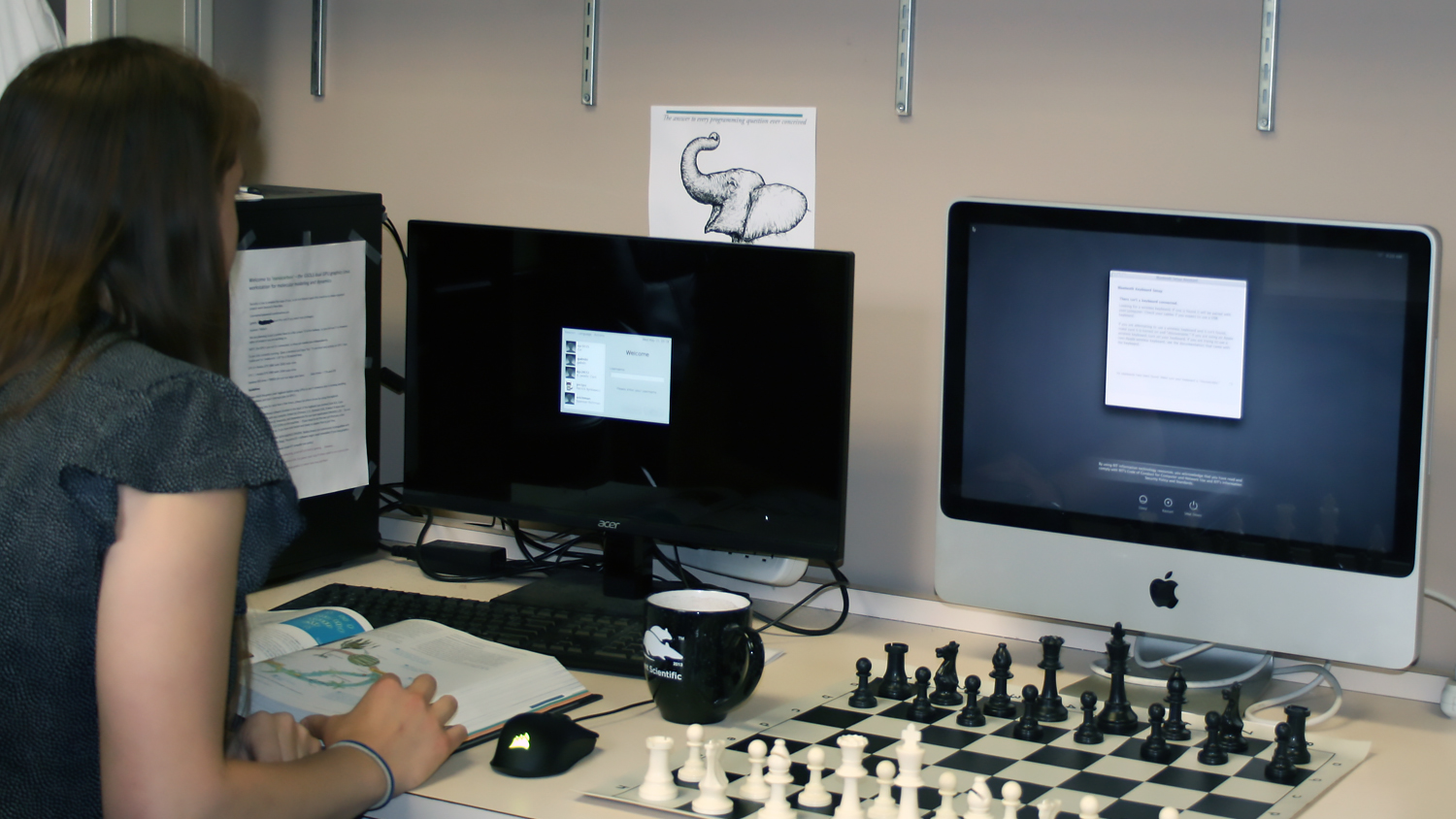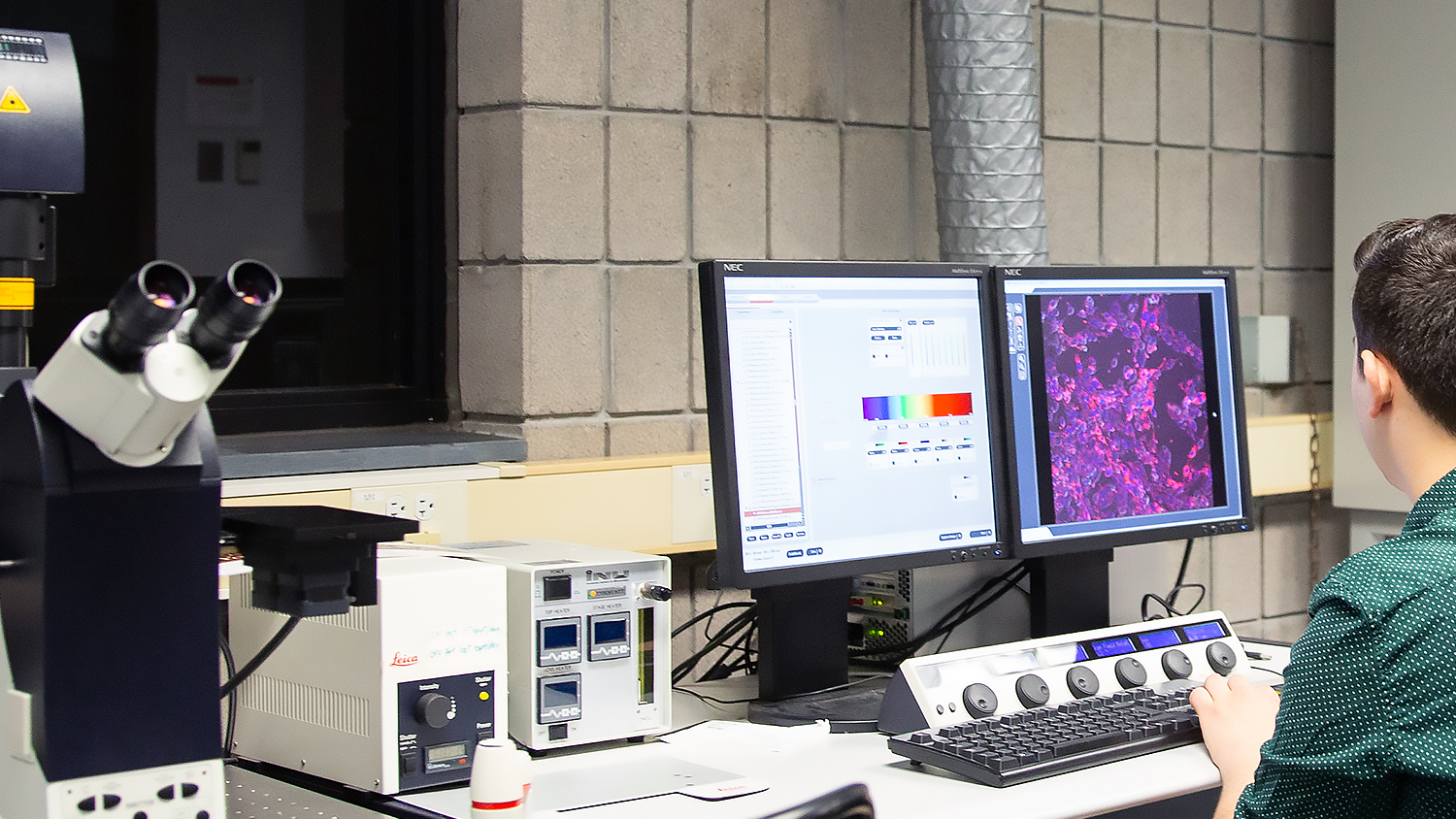Bioinformatics and Computational Biology Bachelor of Science Degree

Bioinformatics and Computational Biology
Bachelor of Science Degree
- RIT /
- Rochester Institute of Technology /
- Academics /
- Bioinformatics and Computational Biology BS
In this dynamic bioinformatics BS, biology and computing combine to analyze big data collected by the health industry to discover, diagnose, and treat a wide range of medical conditions.
4+1
5-year BS/MS in Bioinformatics
$1M+
Equipment in Genomics Enterprise Center
Overview for Bioinformatics and Computational Biology BS
Why Study Bioinformatics at RIT?
Gain Hands-on Experience: Sequence and annotate whole genomes of a variety of organisms using the Illumina MiSeq in the Genomics Lab.
Industry Work Experience: Bioinformatics students gain career exposure and hands-on experience through a required co-op experience.
Jobs at Industry Leading Companies: Recent bioinformatics graduates are employed at the Cleveland Clinic, Newport Labs, and the Dana-Farber Cancer Institute.
A 100% Outcomes Rate: Bioinformatics graduates jump into a number of exciting careers immediately after graduation. They utilize their analytical and computational skills to solve real-world problems.
Pre-Med/Pre-Health Advising Program: Receive personalized guidance to become a competitive candidate for admission to medical schools and graduate programs in the health professions.
Accelerated Bachelor’s/Master’s Available: Earn both your bachelor’s and your master’s in less time and with a cost savings, giving you a competitive advantage in your field.
STEM-OPT Visa Eligible: The STEM Optional Practical Training (OPT) program allows full-time, on-campus international students on an F-1 student visa to stay and work in the U.S. for up to three years after graduation.
Bioinformatics is the intersection of biology and computer science. When enrolled in RIT’s bioinformatics bachelor's degree, you’ll learn how to use computers to analyze, organize, and visualize biological data in ways that increase the understanding of this data and lead to new discoveries.
RIT’s Bioinformatics and Computational Biology Bachelor of Science Degree
The RIT bioinformatics BS includes laboratory exercises and assignments in which you’ll learn to sequence DNA and use computer programs to analyze DNA sequences and predict molecular models. You will also gain critical skills employers look for, including:
- Fundamental training/knowledge in molecular biology, biochemistry and biotechnology, particularly genomics and relational database administration
- Programming skills, such as the ability to use SQL, PERL, C, C++, etc. on a UNIX operating system
- Strong analytical abilities using relevant mathematical/statistical tools
- A strong interest in utilizing computational skills to leverage the data outcomes of those working in the laboratory
- The ability to multitask and meticulously perform the same task repetitively, while working independently
Bioinformatics Careers
Bioinformatics has become essential to the biological sciences. In the past, laboratories were able to manage and analyze their experimental data in spreadsheets. Many research labs now require the expertise of dedicated bioinformatics core centers or their own in-house bioinformaticists. Our bioinformatics and computational biology BS graduates have entered such laboratories, both in industry and academia, as bioinformaticists. Some have also leveraged their biotechnology experiences as wet lab experimentalists themselves. The diversity of skills our students cultivate has given them access to a wide range of career choices.
Furthering Your Education in Bioinformatics
Combined Accelerated Bachelor’s/Master’s Degrees
Today’s careers require advanced degrees grounded in real-world experience. RIT’s Combined Accelerated Bachelor’s/Master’s Degrees enable you to earn both a bachelor’s and a master’s degree in as little as five years of study, all while gaining the valuable hands-on experience that comes from co-ops, internships, research, study abroad, and more.
- Bioinformatics and Computational Biology BS/Bioinformatics MS: This unique accelerated dual-degree in bioinformatics prepares graduates for high-paying careers at the intersection of data science, computation, and biology. Your undergraduate curriculum will be a mix of wet-bench laboratory, computational workshop experiences, and coursework that provide the programming, math, and biology skills needed to understand and analyze large biological data sets such as next-generation sequencing data. You’ll apply that knowledge to a real-world work environment during a paid co-op experience. The flexible MS degree will provide further research opportunities with close mentorship in areas like cancer research, evolutionary biology, and drug design. With two degrees and real work experience, you’ll be ready for a variety of exciting careers at great companies like Moderna, Regeneron Pharmaceuticals, and the Cleveland Clinic.
- +1 MBA: Students who enroll in a qualifying undergraduate degree have the opportunity to add an MBA to their bachelor’s degree after their first year of study, depending on their program. Learn how the +1 MBA can accelerate your learning and position you for success.
Pre-Med/Pre-Health Advising
RIT’s Office of Pre-Health Advising offers an advising program that’s open to all majors and provides personal, individualized academic counseling to help you create a comprehensive long-term strategy to assist you in building successful applications to medical, dental, and veterinary schools or graduate degrees in the health professions (e.g., occupational therapy, physical therapy, etc.). Our pre-health advisors will have in-depth conversations with you around critical topics that include academic planning and course selection, MCAT and other admission exams, undergraduate research opportunities, clinical experiences and field work, timelines, and much more. Learn more about pre-med/pre-health advising.
-
Join Us for Accepted Student Open House
Visit campus on March 28 or April 11 to meet faculty, tour campus, and ask your questions.
Careers and Cooperative Education
Typical Job Titles
| Bioinformatics Analyst | Biomedical Researcher | Biostatistician |
| Computational Biologist | Geneticist | Research Technician |
| Laboratory Technician | Software Programmer | Technical Support Specialist |
Industries
-
Biotech and Life Sciences
-
Medical Devices
-
Pharmaceuticals
-
Health Care
Cooperative Education
What’s different about an RIT education? It’s the career experience you gain by completing cooperative education and internships with top companies in every single industry. You’ll earn more than a degree. You’ll gain real-world career experience that sets you apart. It’s exposure–early and often–to a variety of professional work environments, career paths, and industries.
Co-ops and internships take your knowledge and turn it into know-how. Science co-ops include a range of hands-on experiences, from co-ops and internships and work in labs to undergraduate research and clinical experience in health care settings. These opportunities provide the hands-on experience that enables you to apply your scientific, math, and health care knowledge in professional settings while you make valuable connections between classwork and real-world applications.
Students in the bioinformatics and computational biology degree are required to complete one cooperative education experience.
Featured Work and Profiles
-
Transforming Genomic Data into Cancer Insight
RIT alum Spencer Richman ’20 uses computing and biology to build software that transforms genomic data into tools for cancer detection, helping bridge data and discovery in healthcare.
Read More about Transforming Genomic Data into Cancer Insight -
From Coding Co-op to Cancer Research: Bioinformatics Bridges the Gap
Ammar Naqvi ’06 majored in bioinformatics at RIT and leveraged his co-op to solidify an exciting career path in bioinformatics.
Read More about From Coding Co-op to Cancer Research: Bioinformatics Bridges the Gap -
Love Biology? Hate Formaldehyde? Try Bioinformatics.
Jeselle Clark realized there are biology career paths outside of medicine or ecology. Today she’s a bioinformatics software engineer working at Essex Management, LLC as a contractor for the National...
Read More about Love Biology? Hate Formaldehyde? Try Bioinformatics. -
Bioinformatics: The Intersection of Biology and Computer Science
Spencer Richman ‘20 switched majors when he discovered the bioinformatics program at RIT combined the two things he loved—computer science and biology.
Read More about Bioinformatics: The Intersection of Biology and Computer Science
Curriculum for 2025-2026 for Bioinformatics and Computational Biology BS
Current Students: See Curriculum Requirements
Admissions and Financial Aid
This program is STEM designated when studying on campus and full time.
First-Year Admission
First-year applicants are expected to demonstrate a strong academic background that includes:
- 4 years of English
- 3 years of social studies and/or history
- 3 years of mathematics is required and must include algebra, geometry, and algebra 2/trigonometry. Pre-calculus is recommended.
- 2-3 years of science is required and must include biology and chemistry.
Transfer Admission
Transfer applicants should meet these minimum degree-specific requirements:
- A minimum of college algebra is required. Pre-calculus or calculus is preferred.
- Chemistry and biology are required.
Financial Aid and Scholarships
100% of all incoming first-year and transfer students receive aid.
RIT’s personalized and comprehensive financial aid program includes scholarships, grants, loans, and campus employment programs. When all these are put to work, your actual cost may be much lower than the published estimated cost of attendance.
Learn more about financial aid and scholarships
Accreditation
Research
Undergraduate Research Opportunities
Many students join research labs and can engage in research projects starting as early as their first year. Participation in undergraduate bioinformatics research leads to the development of real-world lab techniques, enhanced problem-solving skills, and broader career opportunities. Our students have opportunities to travel to national conferences for presentations and also become contributing authors on peer-reviewed manuscripts. Explore the variety of life science undergraduate research happening at RIT.
Related News
-
November 12, 2025

Stefan Schulze’s lab aims to build the foundation for new biomedical treatments
Backed by an award from the National Institutes of Health, Assistant Professor Stefan Schulze is using his expertise in the structure and function of proteins to work with a bacterial pathogen commonly associated with antibiotic resistance.
-
May 17, 2023

RIT students awarded international fellowships and scholarships
Several RIT students from a variety of colleges and academic disciplines have been awarded prestigious international fellowships and scholarships.
-
August 17, 2021

RIT scientists model how coronavirus attaches itself to human cells
RIT scientists have uncovered new information about the way coronavirus and several of its variants attach to human cells. The researchers examined how coronaviruses use their spike proteins to attach themselves to the host cells they are attacking.
Contact
- L. Kate Wright
- School Head
- Dean’s Office
- College of Science
- 585‑475‑4669
- lkwsbi@rit.edu
Thomas H. Gosnell School of Life Sciences
























